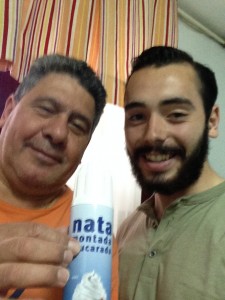Paloma and Juan often talk to me at lighting speed and if I don’t understand I just smile and nod, working in a “Sí” every now and again to show that I am engaged. Unfortunately, they see through my ruse when they ask me something and I continue nodding. They look at me laughing and say “You’re not understanding a word of what we’re saying, are you?” Busted. Although there have been many struggles understanding my host parents, I want to share some special Spanish words and phrases that I have learned from them, overheard while riding the Metro, or learned from other locals that have a special place in my heart.
Nata – My beloved nata. The first new word I learned when I got to Madrid. I remember it like it was yesterday. Juan asked me if I wanted nata with my flan. I looked confused, so he started to explain it, gesticulating like a madman. I finally understood – whipped cream. The next day, when I looked in the fridge, there it was, those four amazing letters emblazoned on the front of the can. Maybe it’s because I have a sweet tooth, or maybe because the word has a nice ring to it, but I will never forget the word nata.
 |
| Juan and I and some nata. |
Hacer el ganso – This phrase literally means, “to do the goose” but it translates into English as goofing around or joking around to make people laugh. Paloma tells me I’m “haciendo el ganso” (doing the goose) around the house, but it started at the dinner table when I asked her for some nata on my salad.
El mundo es un pañuelo – This phrase literally means, “The world is a handkerchief.” In English we say, “It’s a small world.” I had run into a friend in Madrid, one of Spain’s largest cities, and Paloma told me, “The world is a handkerchief.” It was hard for me to understand, until she ran into her bedroom and brought out a handkerchief. It makes sense. It’s a handkerchief world after all.
Bin bon bun bocadillo de atún – In English, the first three words of this phrase sound like “bing, bong, boon.” It literally translates as, “Bing, bong, boon, tuna sandwich.” Doesn’t sound as good in English, but it has a nice rhythm and rhyme in Spanish, and this phrase is used when a food tastes really good, when you achieve a goal in life, or just generally when something is worth being excited about. Spaniards love their tuna, they put it on everything. A “plain” salad in a restaurant is oftentimes a salad with tuna on top. Tuna pizza, tuna pasta, I’ve seen it all. Hence, they reference a tuna sandwich (bocadillo de atún) when something is worth celebrating.
Hasta el cuarenta de mayo, no te quites el sayo – This rhyming phrase is literally translated as “Until the 40th of May, don’t take off your jacket.” We had some rainier weather recently, and Paloma said we have to be absolutely sure that all the bad weather is gone (until the 40th of May), until we put the jackets away.
Tomar el pelo – Literally means “to take the hair” and means to pull the hair or as we say in English, “yanking my chain.” This phrase goes very well with “Hacer el ganso” or with people who have easily accessible hair to give a good yank.
These are only a few of many great phrases I am still learning, and every time I successfully learn a new one, the celebration is accompanied by a tuna sandwich.
 |
| Riding on the Metro, I hear many Spanish idioms that do not always translate directly into English. |
Danny Pasternak is the Spring 2015 CEA MOJO Blogger in Madrid, Spain. He is currently a junior at the University of Michigan.







